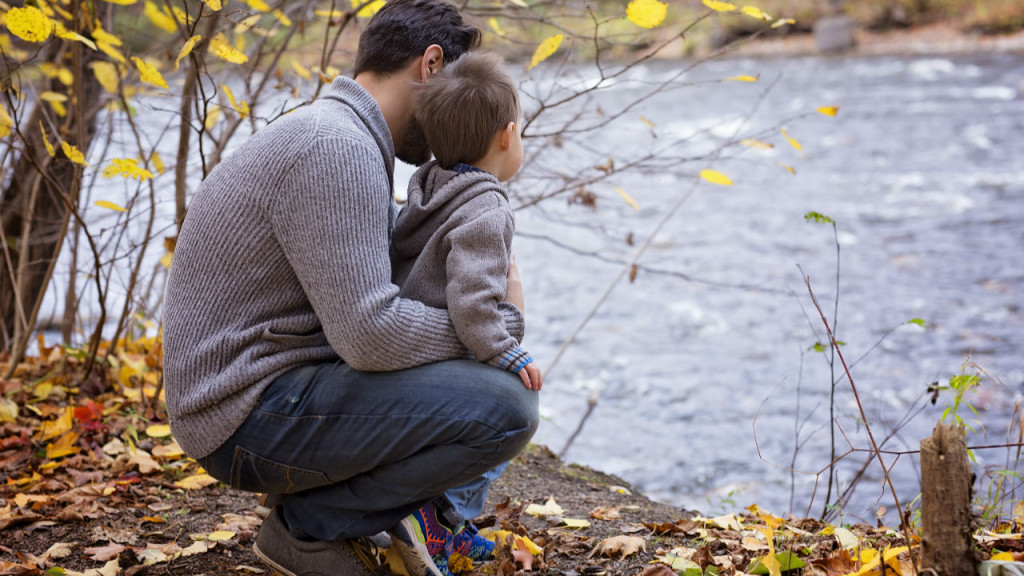
1. Do a breathing exercise
If you’ve never tried meditation before, it’s as simple as sitting down and focusing on the sounds and feelings of your own breath. But for some kids, sitting still is anything but simple. When you want to get your kid involved, Lozano suggests getting colourful pillows and playing some soft music to help get them interested “You want to create a calm, peaceful and loving space so they start to get intrigued about what’s to come,” she says. Then, start by asking them to pretend they’re smelling something yummy, like a freshly baked cake, as they take a deep breath in, then to pretend they’re blowing out candles as they exhale. Keep the exercise short to begin with—say, try it 10 times—then work your way up to several minutes, having your kid focus on their belly rising and falling.
2. Take a nature walk
Sood takes her kids for a mindful walk after school each day, which not only gives them a chance to get some fresh air and benefit from the endorphins that are released with exercise, but also helps them to learn to just be in the present. “Mindfulness is all about exploring the present moment and being aware of your senses,” she says. On their walks, Sood has her kids pick out three or four things from nature, like a branch or a leaf. “When they find that leaf, we touch it, we feel it, we smell it, we talk about it. We explore how it makes us feel,” says Sood. “For them, this is fun and exciting, but they’re really nestled into that present moment. It takes you away from the stress of what is to come. They’re not thinking about activities they have to get ready for, and it helps establish a connection between parent and child.”
3. Come up with a positive mission statement
If you feel a little silly repeating a mantra, you’re not alone, but there’s good reason to start your day with a positive statement or to use it when you are feeling anxious: Focusing on a few carefully chosen words helps you to focus on those words and how you’re feeling when you say them. And if you’re a kid who’s still trying to learning about feelings, it’s a powerful thing to learn that you can take a definitive stance about how you’re going to go through and experience life. “The spoken words that we’re using are so important for the way that we feel and for the belief systems that we’re creating for ourselves,” says Lozano. Every day, when she wakes up her little girl for school, they repeat her affirmation together: “I am healthy, I am strong, I am loving, I am happy.”
4. Talk about gratitude
Chances are you’ve taught your child to mindlessly say “please” and “thank you,” but have you ever taught them to express true gratitude? At Sood’s house, before every family meal, they go around the table and name something they’re grateful for. It could be something they play with, time spent with a friend or family member, or something that happened that day. At first, their answers may not exactly be profound—expect to get a few “I so grateful for my new Lego set” comments—but as you present your own things you’re grateful for, your kids will begin to pick up on your values, like health and family. “If we focus on the things that bring us joy and happiness, then that happiness expands,” says Sood.
5. Embrace feelings of all kinds
Let’s face it—kids are kids, and sometimes tantrums happen. Part of being mindful is learning to accept your feelings without judgment, and that’s something that parents need to model. But it’s easier said than done, says Sood. “If they are upset, they can be upset. Don’t try to make them do meditation breathing in the middle of their tantrum. It’s not going to work and it might feel like a punishment for them.” First of all, take some deep breaths yourself to calm yourself down during their tantrum. Once your child has calmed down a bit, you can talk to them about what they’re feeling and then you can do some breathing and talk about solutions for next time. If you’re struggling to keep your cool, Lozano suggests asking your spouse to step in until you can collect your thoughts.
Finally, approach mindfulness with too many expectations. Part of passing on mindfulness is practising what you preach and, “When we have expectations, we’re living in the future, and that takes us out of the present moment,” says Sood. So if you expect your kid to love mindfulness and they’re not feeling it, just let it go. Your child will learn more from your go-with-the-flow attitude than from you trying to force a practice on them.
Source: https://www.todaysparent.com/kids/kids-health/mindfulness-activities-for-kids-no-meditation-required/

 KSA
KSA Bahrain
Bahrain UAE
UAE Qatar
Qatar Jordan
Jordan Egypt
Egypt Turkey
Turkey South Africa
South Africa




(0) Comments